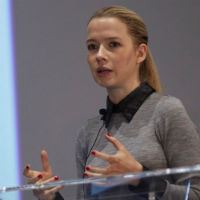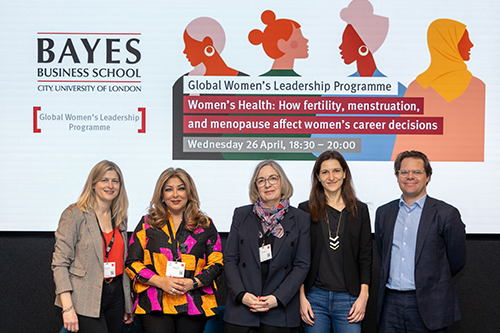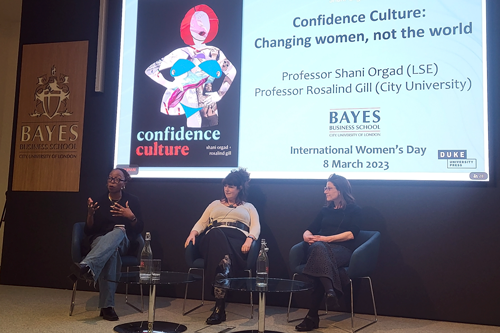Wellness is a trap
Dr Stephanie Alice Baker and Daniella Isaacs discuss the pitfalls of wellness culture on women’s careers for International Women’s Day.
To celebrate International Women’s Day, the Bayes Global Women’s Leadership Programme (GWLP) hosted the event “The Wellness Trap: How wellness culture is impacting on women’s careers”.
Around 90 audience members attended the event on campus at Bayes Business School (formerly Cass) to hear from panellists Dr Stephanie Alice Baker (Reader in Sociology at City, University of London), Daniella Isaacs (an actor and writer), and moderator Natalie Bonnick (Bayes student).
Dr Baker began the event by giving a lecture on her research about the online networks of disinformation, pointing to memes targeting women.
The lecture was followed by a panel talk between Dr Baker and Daniella Isaacs. Ms Isaac’s solo stage show “Hear Me Raw” explores the contemporary obsession with wellness, and tackled body-image, addiction, social media and anxiety.
Moderator Natalie Bonnick is a GWLP Board Member and an Executive MBA programme student.
The GWLP coordinates scholarships for students, organises skills-based workshops and organises panel events to help inspire and connect women who aim to become leaders.
The cult of wellness
Dr Baker explained how the original concept of wellness, as envisioned by statistician Dr Halbert L Dunn in the 1950s, was a holistic vision of health that combined mind, body and spirit.
For Dr Dunn, wellness was more than the just the absence of illness. Instead, wellness incorporated having meaning or purpose in one’s life and living within a favourable environment.
Today, wellness has become individualised and moralised and is marketed in every sphere. From taking multivitamins, to drinking kombucha and wearing health tech that monitors your glucose levels, products and services are advertised with their health benefits at the forefront.
In recent years, workplace wellness programmes – on topics like stress reduction – have also proliferated. These, Dr Baker pointed out, remain beneficial to companies because they are designed to reduce absenteeism and increase productivity.
“Wellness should not be reduced to a commodity that we can purchase,” Dr Baker says. “It’s a testament to the success of branding that the concept has been so enduring and every industry wants to incorporate it— from skincare to dog food!”
Actor Daniella Isaacs fell prey to wellness culture following a stint copywriting for a wellness app. She developed orthorexia, an unhealthy obsession with healthy living, and started overexercising.
“Getting deep into wellness gave me a solution for my unhappiness where I could follow rules,” she said.
Over time, her hair thinned, her skin blemished and her periods stopped. She was so focused on her pursuit of wellness – and following the rules prescribed by wellness culture – that her wellbeing suffered. She started to lose her sense of self and her mental heath worsened.
“I realised this wasn’t wellness, it was illness,” she said.
Wellness becomes an individual rather than collective pursuit
Dr Baker’s research found a crossover between the far-right movement and anti-vaccine conspiracies. She noted these conspiracy theorists hijack concepts from liberal and feminist movements.
Through memes and hashtags, users promote forms of political propaganda but also community-building.
She asked audience members to think critically about online influencers and pointed out the lack of regulations online.
“All influencers are trying to promote something. They are a brand,” she said. “Even if they are not posting for financial gain, influencers might be looking for clout, or political or social gain.”
An audience member likened the wellness industry to the oil industry, citing how oil giant BP developed the concept of the “carbon footprint”, thereby shifting the blame away from large corporates to individuals.
“People are turning to alternative forms of wellness because traditional systems are letting them down,” Ms Isaacs added. “In a sneaky way, the concept of ‘wellness’ enables change not to happen because it puts the onus of change on ourselves, rather than in wider societal and systemic issues.”





